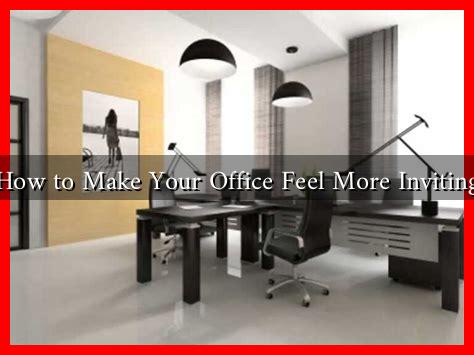-
Table of Contents
- How to Make Your Office Feel More Inviting
- Understanding the Importance of an Inviting Office
- Key Elements to Create an Inviting Office
- 1. Optimize Natural Light
- 2. Incorporate Comfortable Furniture
- 3. Add Personal Touches
- 4. Use Color Psychology
- 5. Create Collaborative Spaces
- Case Study: Google’s Office Design
- Conclusion
How to Make Your Office Feel More Inviting
Creating an inviting office environment is essential for fostering productivity, collaboration, and employee satisfaction. A well-designed workspace can significantly impact morale and performance, making it crucial for businesses to invest in their office aesthetics. In this article, we will explore various strategies to make your office feel more welcoming and engaging.
Understanding the Importance of an Inviting Office
Research shows that the physical workspace can influence employee behavior and attitudes. According to a study by the Gartner Group, 75% of remote workers prefer to continue working from home, highlighting the need for companies to create an appealing office environment that encourages employees to return. An inviting office can lead to:
- Increased employee engagement
- Higher productivity levels
- Improved collaboration among team members
- Enhanced employee retention rates
Key Elements to Create an Inviting Office
1. Optimize Natural Light
Natural light is a powerful mood enhancer. Studies have shown that exposure to natural light can improve focus and reduce eye strain. To maximize natural light in your office:
- Use sheer curtains to allow light while maintaining privacy.
- Position desks near windows whenever possible.
- Incorporate glass partitions to allow light to flow through the space.
2. Incorporate Comfortable Furniture
Comfortable and ergonomic furniture is essential for creating a welcoming atmosphere. Employees are more likely to feel at ease in a space that prioritizes their comfort. Consider the following:
- Invest in adjustable chairs and desks to accommodate different preferences.
- Provide lounge areas with soft seating for informal meetings.
- Use standing desks to promote movement and reduce fatigue.
3. Add Personal Touches
Encouraging employees to personalize their workspace can foster a sense of ownership and belonging. Here are some ideas:
- Allow employees to decorate their desks with personal items, such as photos or plants.
- Incorporate a communal board where team members can share achievements or personal milestones.
- Host regular “office beautification” days where employees can contribute to the overall aesthetic.
4. Use Color Psychology
The colors in your office can significantly affect mood and productivity. Research in color psychology suggests that:
- Blue promotes calmness and focus.
- Green encourages creativity and innovation.
- Yellow stimulates energy and optimism.
Consider painting accent walls or using colorful decor to create an inviting atmosphere that aligns with your company culture.
5. Create Collaborative Spaces
Designing areas that encourage collaboration can make your office feel more inviting. Consider the following:
- Establish open spaces with comfortable seating arrangements for brainstorming sessions.
- Incorporate whiteboards or chalkboards for idea sharing.
- Provide technology-enabled meeting rooms for seamless collaboration.
Case Study: Google’s Office Design
Google is renowned for its innovative office designs that prioritize employee well-being. Their offices feature open spaces, recreational areas, and a variety of work environments that cater to different needs. This approach has resulted in high employee satisfaction and retention rates, demonstrating the effectiveness of an inviting office design.
Conclusion
Creating an inviting office environment is not just about aesthetics; it’s about fostering a culture of collaboration, comfort, and creativity. By optimizing natural light, incorporating comfortable furniture, allowing personal touches, using color psychology, and creating collaborative spaces, businesses can significantly enhance their workplace atmosphere. As demonstrated by companies like Google, investing in an inviting office can lead to improved employee engagement and productivity. Ultimately, a welcoming office is a key component of a successful and thriving workplace.

